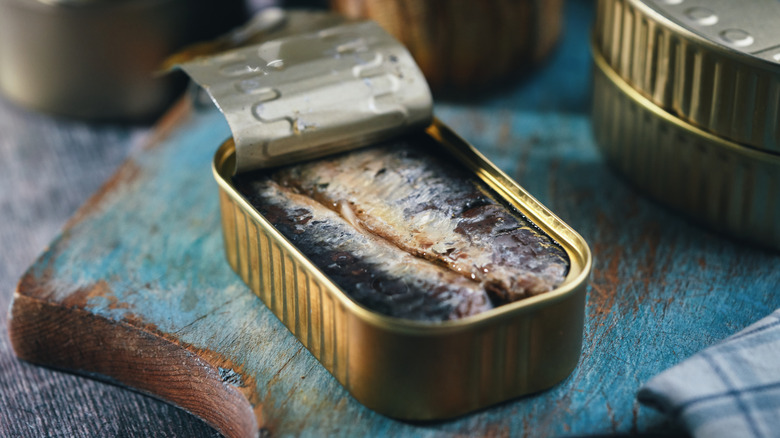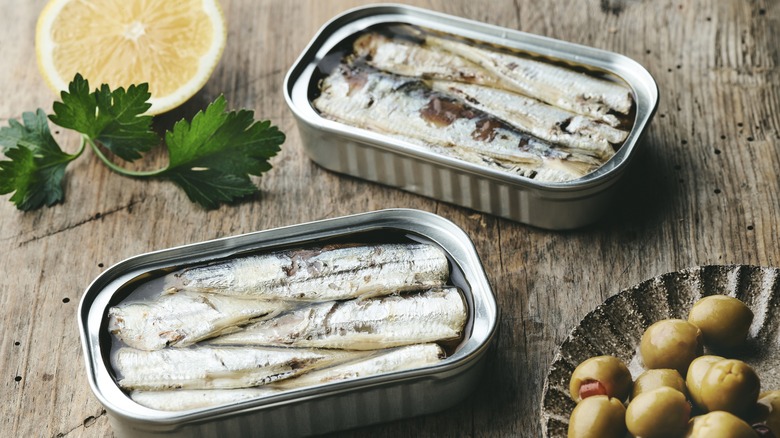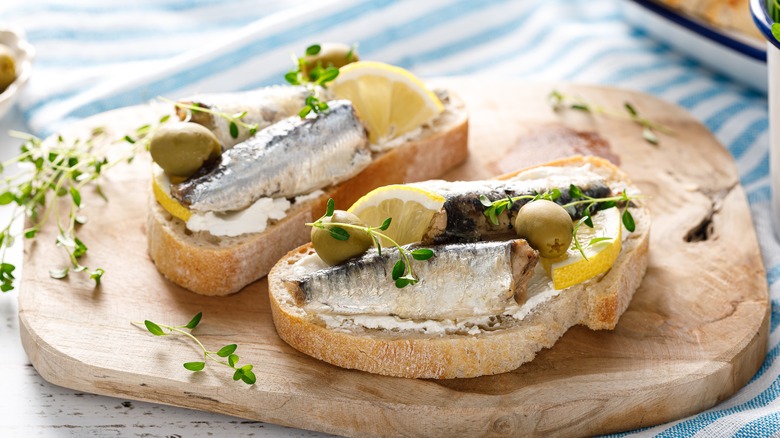The Canned Sardine Labels You Should Always Look Out For
When we hear the phrase "overfishing," many of us think of expensive Chilean sea bass or bluefin tuna. Our minds don't immediately jump to the little sardines packed into small tins on grocery store shelves, but these fish are just as much at risk for overfishing. In fact, between 2006 and 2016 alone, sardine populations off the Portuguese coasts fell by 80% due to unsustainable overfishing.
As consumers, the first step we can take is to learn about sardines and favor brands that practice sustainable harvesting. These brands can be identified by labels like MSC and ENEEK, which are certifications by the Marine Stewardship Council and Basque Country, respectively. The blue MSC label signals that a fishery is maintaining healthy sardine populations, taking care to keep affected ecosystems in balance, and staying up-to-date with ever-changing environmental laws. The ENEEK label, on the other hand, certifies a product as being organic by EU standards, which also entails following sustainable practices.
Alternative to MSC and ENEEK certifications, you can also look for Friend of the Sea labeling. This organization's regulations extend to a wider range of species across the globe, in addition to addressing carbon footprint. For instance, you might find a FoS label on whole branzino, confirming the fish has been sustainably farmed.
Which sardine manufacturers are certified as sustainable?
Unfortunately, not too many sardine manufacturers are currently MSC or ENEEK certified, as they must meet strict regulations for sustainable fishing. As of 2024, the Marine Stewardship Council lists only three fisheries that meet its standards: South Australia Fishery, Cornwall Fishery, and Small Pelagics Fishery. Of course, these names don't always appear on canned sardines, so it's important to look at where specific brands are sourcing their fish.
Fishwife Sardines, for instance, explicitly states on its website that the brand has partnered with Cornwall Fishery. Escal and Sea Tales sardines are also sourced from Cornwall, making them equally good choices. However, other brands might include vague locations like the Baltic Sea or off the coasts of Portugal, with a closer look showing these areas to have lost their certifications.
Their packaging may still include the MSC label, which can be misleading to customers looking for a simple guide to sustainable seafood. As such, you should always be on the lookout for specificity of location on sardine packaging and then corroborate the information with the MSC itself to ensure the certification is still active.
Additional considerations for purchasing canned sardines
Because it may not always be possible to pick out sustainability-certified sardine manufacturers, there are a few other bits of information you can look for on labels. One item of importance is the means of fishing, with purse seine being most ideal. Purse seine entails dropping a net around targeted schools of fish, therefore reducing bycatch while methods like long-line and bottom-trawling are nondiscriminatory of species. Worse, trawling involves dragging a weighted net along the ocean floor, potentially destroying delicate habitats for current and future occupants.
Last but not least (and solely for the sake of taste), consider following Alton Brown's rule about buying oil-packed sardines over water-packed. Sardines are naturally oily, so being submerged in high-quality olive oil helps retain their flavor and texture. Yes, you'll pay a bit more for the luxury, but the cheaper alternatives –- whether unflavored oil or water –- will leave sardines mushy and devoid of their signature taste.



